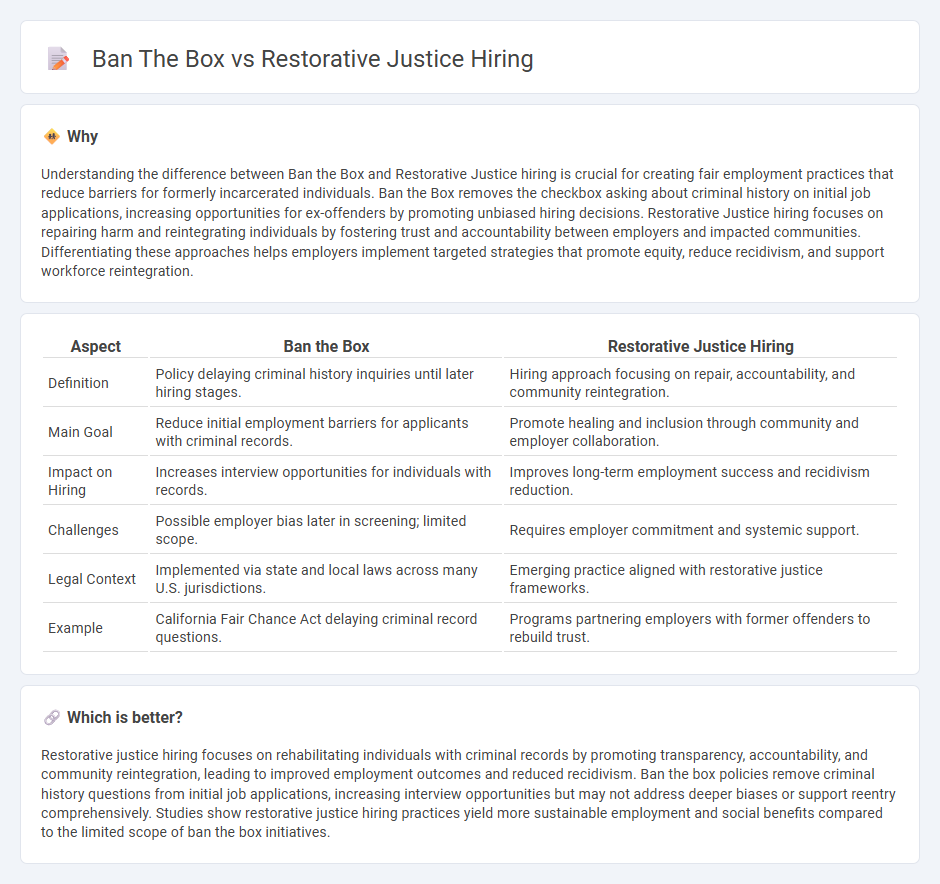
Ban the Box policies remove criminal history questions from initial job applications to increase employment opportunities for individuals with criminal records. Restorative justice hiring focuses on repairing harm and promoting accountability through inclusive employment practices that support reintegration. Discover how these approaches transform workforce diversity and equity.
Why it is important
Understanding the difference between Ban the Box and Restorative Justice hiring is crucial for creating fair employment practices that reduce barriers for formerly incarcerated individuals. Ban the Box removes the checkbox asking about criminal history on initial job applications, increasing opportunities for ex-offenders by promoting unbiased hiring decisions. Restorative Justice hiring focuses on repairing harm and reintegrating individuals by fostering trust and accountability between employers and impacted communities. Differentiating these approaches helps employers implement targeted strategies that promote equity, reduce recidivism, and support workforce reintegration.
Comparison Table
| Aspect | Ban the Box | Restorative Justice Hiring |
|---|---|---|
| Definition | Policy delaying criminal history inquiries until later hiring stages. | Hiring approach focusing on repair, accountability, and community reintegration. |
| Main Goal | Reduce initial employment barriers for applicants with criminal records. | Promote healing and inclusion through community and employer collaboration. |
| Impact on Hiring | Increases interview opportunities for individuals with records. | Improves long-term employment success and recidivism reduction. |
| Challenges | Possible employer bias later in screening; limited scope. | Requires employer commitment and systemic support. |
| Legal Context | Implemented via state and local laws across many U.S. jurisdictions. | Emerging practice aligned with restorative justice frameworks. |
| Example | California Fair Chance Act delaying criminal record questions. | Programs partnering employers with former offenders to rebuild trust. |
Which is better?
Restorative justice hiring focuses on rehabilitating individuals with criminal records by promoting transparency, accountability, and community reintegration, leading to improved employment outcomes and reduced recidivism. Ban the box policies remove criminal history questions from initial job applications, increasing interview opportunities but may not address deeper biases or support reentry comprehensively. Studies show restorative justice hiring practices yield more sustainable employment and social benefits compared to the limited scope of ban the box initiatives.
Connection
Ban the Box policies remove criminal history questions from job applications, increasing employment opportunities for individuals with past convictions. Restorative justice hiring complements this approach by focusing on rehabilitation and community reintegration, emphasizing skills and character over criminal records. Together, these practices promote fair hiring, reduce recidivism, and foster inclusive workplaces aligned with social equity goals.
Key Terms
Criminal Record Disclosure
Restorative justice hiring emphasizes transparency and support by encouraging open dialogues about criminal record disclosure, fostering trust between employers and candidates. Ban the Box policies inhibit early criminal record inquiries on job applications, aiming to reduce immediate discrimination but potentially leading to delayed disclosure challenges. Explore how these approaches impact employment outcomes and criminal record transparency to better understand their societal and workplace implications.
Second Chance Employment
Restorative justice hiring practices emphasize repairing harm and reintegrating individuals with criminal records into the workforce, fostering trust between employers and candidates. Ban the Box policies remove the criminal history question from initial job applications, increasing fair hiring opportunities and reducing discrimination against formerly incarcerated individuals. Explore how these approaches advance Second Chance Employment initiatives that promote workforce inclusion and economic empowerment.
Rehabilitation
Restorative justice hiring emphasizes transformative rehabilitation by prioritizing applicants' accountability and personal growth, fostering second chances through community-centered approaches. Ban the Box policies remove initial criminal history questions from job applications, aiming to reduce discrimination but often lack direct focus on rehabilitation outcomes. Explore how these strategies uniquely impact reintegration and support for formerly incarcerated individuals.
Source and External Links
Restorative Justice Mediation Jobs, Employment - Browse more than 160 active restorative justice jobs, including roles such as Restorative Justice Coordinator and Outreach Worker, with opportunities in various locations and sectors.
Urgent! Restorative justice jobs - July 2025 (with Salaries!) - Explore full-time, part-time, and flexible restorative justice job openings--for example, Restorative Practices Teacher on Special Assignment and Restorative Justice Case Manager Specialist--with competitive salaries and diverse employment types.
Job Opportunities - nacrj - Access a curated list of restorative justice and community-based job postings, and sign up for notifications about new openings in the field.
 dowidth.com
dowidth.com